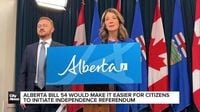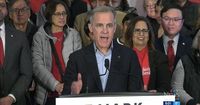On April 29, 2025, Alberta Premier Danielle Smith unveiled a series of proposed changes to the province's election laws, aiming to enhance the democratic process and increase public participation. The legislation, known as Bill 54, the Election Statutes Amendment Act, seeks to lower the threshold for calling referendums, reintroduce corporate and union political donations, and eliminate the practice of vouching for voter identity at polling stations.
Premier Smith has expressed a desire to see more referendums on the ballot, stating, "These changes build on the integrity, trust, and openness that have always been at the heart of democracy and keep Alberta strong and free." The proposed changes come in the wake of a federal election, where the Liberal party, led by Prime Minister Mark Carney, secured a fourth consecutive term, leaving some Albertans feeling disenfranchised.
Among the key provisions of Bill 54 is the plan to lower the number of signatures required to initiate a referendum or recall an elected official. Currently, a petition must collect signatures from approximately 600,000 eligible voters, about 20% of Alberta's eligible voters based on the 2019 election turnout. If passed, the new law will cut this requirement in half to just 10% of those who participated in the last general election.
Additionally, the bill proposes extending the time frame for collecting these signatures. For instance, the collection period for a recall petition would increase from 60 to 90 days, while the time allowed for a citizen initiative or referendum would extend from 90 to 120 days.
Smith's government is also looking to reintroduce corporate and union donations to political parties, which had been banned by the previous NDP government in 2015. Under the new legislation, contributions would be capped at $5,000 for parties, constituency associations, candidates, and third-party political advertisers. Leadership candidates would also face a similar limit.
Justice Minister Mickey Amery emphasized that the new rules would ensure transparency, stating, "All candidates have to account for where their money is coming from, who it's coming from, and make sure that that is publicly disclosed to members of the public." He also noted that corporate donations would not be tax-deductible, setting a different standard from previous regulations.
Another significant change proposed in Bill 54 is the elimination of the vouching process, which currently allows voters without proper identification to cast their ballots if another eligible voter vouches for them. The new legislation would expand the types of identification accepted at polling stations but would require voters to present valid proof of residency in their electoral district.
Moreover, the bill seeks to ban the use of electronic vote tabulators, mandating that all votes be counted by hand. This measure is intended to protect the integrity of the election process and ensure that results are accurate. The government has set a deadline of 12 hours for the unofficial vote count to be completed after polls close.
While the proposed changes have garnered support from some quarters, they have also raised concerns among critics. MLA Irfan Sabir, the NDP Opposition justice critic, expressed worries that the government is loosening the rules around referendums to stir separatist sentiments among its base. He stated, "I think elections should not be about who has more money or has deep pockets. Elections should be about ideas and broader participation from the public."
Smith's government has framed these changes as a way to empower Albertans and strengthen democracy, but the timing of the bill's introduction—just a day after the federal election—has led to speculation about its motivations. Political analysts have noted that the UCP is attempting to capitalize on the frustrations many Albertans feel toward the federal government.
In her announcement, Smith also indicated that her government would not actively pursue a referendum on Alberta's independence, although she acknowledged the growing sentiment among some Albertans for greater autonomy. She stated, "In the weeks and months ahead, Albertans will have an opportunity to discuss our province's future, assess various options for strengthening and protecting our province against future hostile acts from Ottawa, and to ultimately choose a path forward."
This statement reflects the ongoing tension between Alberta and the federal government, particularly concerning energy policies and resource management. Smith has previously threatened a national unity crisis unless the federal government addresses Alberta's concerns regarding energy development.
As the UCP prepares for a special caucus meeting on May 2, 2025, to discuss the province's future in light of the recent federal election results, the implications of Bill 54 will be closely watched by both supporters and critics alike. The proposed changes could significantly reshape Alberta's political landscape and influence the dynamics of future elections.
In the broader context, the introduction of Bill 54 is part of a larger narrative in Canadian politics, where provincial governments are increasingly asserting their rights and pushing back against federal policies perceived as detrimental to their interests. The outcome of this legislative push could have lasting effects on Alberta's political climate and its relationship with Ottawa.
Overall, the proposed changes encapsulate a pivotal moment for Alberta as it navigates its political future amid shifting federal dynamics and internal calls for greater autonomy. As the debate unfolds, Albertans will be watching closely to see how these changes impact their democratic rights and the overall integrity of the electoral process.





